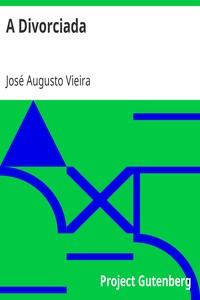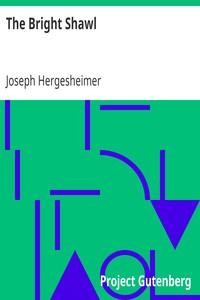Read this ebook for free! No credit card needed, absolutely nothing to pay.
Words: 35670 in 9 pages
This is an ebook sharing website. You can read the uploaded ebooks for free here. No credit cards needed, nothing to pay. If you want to own a digital copy of the ebook, or want to read offline with your favorite ebook-reader, then you can choose to buy and download the ebook.
rder of Tirso. Fear closed his throat and pinched his heart with icy fingers; but he ignored, rose above, himself, in a tremendous accession of his determination to drive injustice--if not yet from the world--from Cuba.
How little, he thought, anyone knew him who advised a return to America. Before the cold violent fact of death a great part of his early melodramatic spirit evaporated; the last possible trace of any self-glorification left him, the lingering mock-heroics of boyhood were gone. His emotion, now, was almost exultant; like a blaze of insuperable white light it drowned all the individual colors of his personality; it appeared to him almost that he had left the earth, that he was above other men.
More than anything, he continued, he would require wisdom, the wisdom of patience, maturity; Tirso had been completely wasted. He was seated, again, on the roof of his hotel, and again it was night: the guitars were like a distant sounding of events evolved in harmonies, and there was the gleam of moonlight on the sea, a trace of the moon and the scent of mignonette trees.
He was, he felt, very old, grave, in deportment; this detachment from living must be the mark of age. Charles had always been a little removed from activity by sickness; and now his almost solitary, dreaming habit of existence had deepened in him. He thought, from time to time, of other periods than his own, of ages when such service as his had been, for gentlemen, the commonplace of living: he saw, in imagination, before the altar of a little chapel, under the glimmer of tall candles, a boyish figure kneeling in armor throughout the night. At morning, with a faint clashing of steel, the young knight under a vow rode into black forests of enchanted beasts and men and impure magic, from which he delivered the innocent and the pure in heart.
Charles Abbott recalled the burning of the Protestant Cranmer, and, as well, the execution of John Felton for posting the Papal bull against the Queen on the door of London House. They too, like the knights of Arthurian legend, had conquered the flesh for an ideal. He was carried in spirit into a whole world of transcendent courage, into a company who scorned ease and safety in the preservation of an integrity, a devotion, above self. This gave him a release, the sense that his body was immaterial, that filled him with a calm serious fervor.
He was conscious, through this, of the ceaseless playing of the guitars, strains of jotas and malague?as, laden with the seductiveness, the fascination, of sensuous warm life. It was, in its persistence, mocking; and finally it grew into a bitter undertone to the elevation of his thought: he wanted, like Savonarola, to bring to an end the depravity of the city; he wanted to cleanse Havana of everything but the blanched heavenly ardor of his own dedication. The jotas continued and the scent of mignonette increased. The moon, slipping over the sea, shone with a vague brightness on the leaves of the laurels below, on the whiteness of marble walks, and in the liquid gleam of fountains. A woman laughed with a note of uncertainty and passion.... It was all infinitely removed from him, not of the slightest moment. What rose, dwelt, in Charles was a breath of eternity, of infinitude; he was lost in a vision of good beyond seasons, changeless, and for all men whomsoever. It must come, he told himself so tensely that he was certain he had cried his conviction aloud. The music sustained its burden of earthly desire to which the harsh whispering rustle of the palm fronds added a sound like a scoffing laughter.
At the Plaza de Toros, the following Sunday afternoon, Charles saw La Clavel; she was seated on an upper tier near the stand of the musicians, over the entrance for the bulls; and, in an audience composed almost entirely of men, she was brilliantly conspicuous in a flaming green mant?n embroidered in white petals; her mantilla was white, and Charles could distinguish the crimson blot of the flower by her cheek. The brass horns and drums of the band were making a rasping uproar, and the crowded wooden amphitheatre was tense with excitement. Andr?s Escobar, beside Charles, was being gradually won from a settled melancholy; and, in an interested voice, he spoke to Charles about the espada, Jos? Ponce, who had not yet killed a bull in Cuba, but who was a great hero of the ring in Spain and South America.
"There is La Clavel," Charles said by way of reply; "she is with Captain Santacilla, and I think, but I can't be sure, the officer Tirso tried to choke to death. What is his name--de Vaca, Gaspar Arco de Vaca."
"Even that," Andr?s answered, "wasn't accomplished. La Clavel's engagement in Havana is over; I suppose it will be Buenos Aires next. Do you remember how we swore to follow her all over the world, and how Tirso wanted to drag her volanta in place of the horses? At heart, it's no doubt, she is Spanish, and yet.... There's the procession."
The key bearer, splendid in velvet and gold and silver, with a short cloak, rode into the ring followed by the picadores on broken-down horses: their legs were swathed in leather and their jackets, of ruby and orange and emerald, were set with expensive lace. They carried pikes with iron points; while the banderilleros, on foot, with hair long and knotted like a woman's, hung their bright cloaks over an arm and bore the darts gay with paper rosettes.
The espada, Jos? Ponce, was greeted with a savage roar of approbation; he was dressed in green velvet, his zouave jacket heavy with gold bullion; and his lithe slender dark grace recalled to Charles Abbott La Clavel. Charles paid little attention to the bull fighting, for he was far in the sky of his altruism; his presence at the Plaza de Toros was merely mechanical, the routine of his life in Havana. Across from him the banked humanity in the cheaper seats ? sol, exposed to the full blaze of mid-afternoon, made a pattern without individual significance; he heard the quick bells of the mules that dragged out the dead bulls; a thick revolting odor rose from the hot sand soaked with the blood and entrails of horses.
At times, half turning, he saw the brilliant shawl of the dancer, and more than once he distinguished her voice in the applause following a specially skilful or daring pass. He thought of her with a passionate admiration unaffected by the realization that she had brought them the worst of luck: perhaps any touch of Spain was corrupting, fatal. And the sudden desire seized him to talk to La Clavel and make sure that her superb art was unshadowed by the disturbing possibilities voiced by Andr?s.
Free books android app tbrJar TBR JAR Read Free books online gutenberg
More posts by @FreeBooks

: You Don't Make Wine Like the Greeks Did by Fisher David E Summers Leo Illustrator - Science fiction; Psychological fiction; Time travel Fiction; Man-woman relationships Fiction Science Fiction










